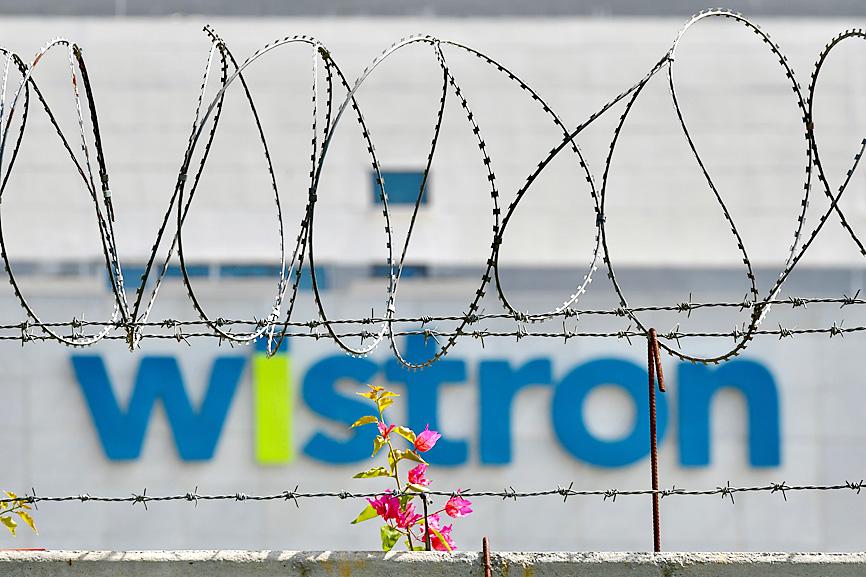A riot on Saturday at a Wistron Corp (緯創) plant in India resulted in estimated losses of 4.37 billion rupees or almost NT$1.7 billion (US$59.75 million), Indian media reported.
The Times of India yesterday reported that the preliminary estimate of losses included thousands of iPhones stolen during the riot.
Wistron would suspend operations at the iPhone factory in Karnataka state for two weeks, a source familiar with the incident said.

Photo: AFP
Because the incident occurred before the peak Christmas season, Wistron’s losses could exceed the preliminary estimate, the source added.
About 2,000 workers at Wistron’s Narasapura factory, became enraged after the night shift, apparently over pay cuts, destroying furniture and factory assembly units, according to Indian media, which said there were even attempts to set fire to vehicles on site.
The Times of India on Sunday reported that the employees were angry because they were not being paid the wages they agreed upon when they were recruited.
A Wistron representative later confirmed that some office furniture at the factory was damaged, but equipment on the main assembly lines and in the warehouses remains intact.
Indian police have arrested about 130 people in relation to the incident, sources said.
Wistron on Sunday said the riot at the plant in Narasapura was caused by unidentified outside instigators who broke into the factory and sabotaged the facility, adding that the company would work with authorities and police to investigate the incident.
Karnataka Minister of Labor Shivaram Hebbar told Indian news media on Sunday that the disputes about labor contracts between Wistron and its workers has dragged on for more than three months.
Wistron’s production lines in India have long been dedicated to assembling more affordable iPhones, with the iPhone SE accounting for the majority of production, and starting in the second half of this year they have rolled out smaller iPhone 12 models, local media has reported.
Wistron is able to move production capacity to other factories in India and Kunshan, China, to make up the shortfall caused by the violence at the Narasapura plant, so the effect on the company should be limited, analysts said.
However, Apple could decide to investigate Wistron for possible breach of its supplier code of conduct, an analyst said.

SEMICONDUCTORS: The German laser and plasma generator company will expand its local services as its specialized offerings support Taiwan’s semiconductor industries Trumpf SE + Co KG, a global leader in supplying laser technology and plasma generators used in chip production, is expanding its investments in Taiwan in an effort to deeply integrate into the global semiconductor supply chain in the pursuit of growth. The company, headquartered in Ditzingen, Germany, has invested significantly in a newly inaugurated regional technical center for plasma generators in Taoyuan, its latest expansion in Taiwan after being engaged in various industries for more than 25 years. The center, the first of its kind Trumpf built outside Germany, aims to serve customers from Taiwan, Japan, Southeast Asia and South Korea,

Gasoline and diesel prices at domestic fuel stations are to fall NT$0.2 per liter this week, down for a second consecutive week, CPC Corp, Taiwan (台灣中油) and Formosa Petrochemical Corp (台塑石化) announced yesterday. Effective today, gasoline prices at CPC and Formosa stations are to drop to NT$26.4, NT$27.9 and NT$29.9 per liter for 92, 95 and 98-octane unleaded gasoline respectively, the companies said in separate statements. The price of premium diesel is to fall to NT$24.8 per liter at CPC stations and NT$24.6 at Formosa pumps, they said. The price adjustments came even as international crude oil prices rose last week, as traders

SIZE MATTERS: TSMC started phasing out 8-inch wafer production last year, while Samsung is more aggressively retiring 8-inch capacity, TrendForce said Chipmakers are expected to raise prices of 8-inch wafers by up to 20 percent this year on concern over supply constraints as major contract chipmakers Taiwan Semiconductor Manufacturing Co (TSMC, 台積電) and Samsung Electronics Co gradually retire less advanced wafer capacity, TrendForce Corp (集邦科技) said yesterday. It is the first significant across-the-board price hike since a global semiconductor correction in 2023, the Taipei-based market researcher said in a report. Global 8-inch wafer capacity slid 0.3 percent year-on-year last year, although 8-inch wafer prices still hovered at relatively stable levels throughout the year, TrendForce said. The downward trend is expected to continue this year,

POWERING UP: PSUs for AI servers made up about 50% of Delta’s total server PSU revenue during the first three quarters of last year, the company said Power supply and electronic components maker Delta Electronics Inc (台達電) reported record-high revenue of NT$161.61 billion (US$5.11 billion) for last quarter and said it remains positive about this quarter. Last quarter’s figure was up 7.6 percent from the previous quarter and 41.51 percent higher than a year earlier, and largely in line with Yuanta Securities Investment Consulting Co’s (元大投顧) forecast of NT$160 billion. Delta’s annual revenue last year rose 31.76 percent year-on-year to NT$554.89 billion, also a record high for the company. Its strong performance reflected continued demand for high-performance power solutions and advanced liquid-cooling products used in artificial intelligence (AI) data centers,